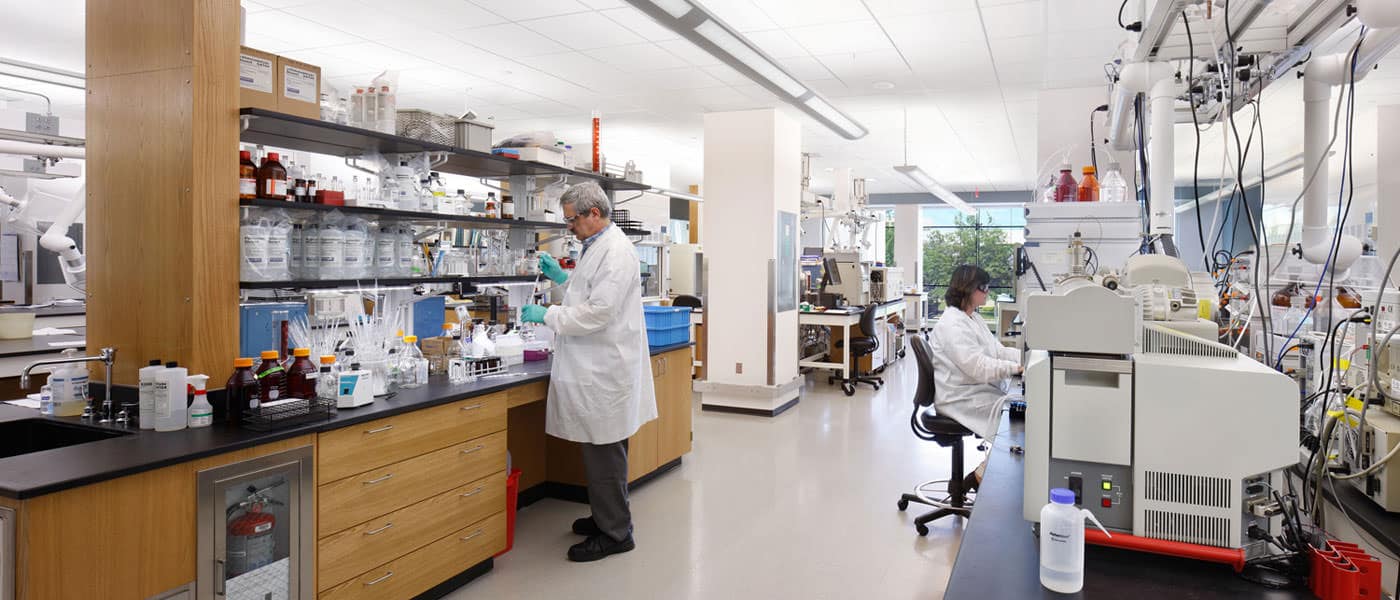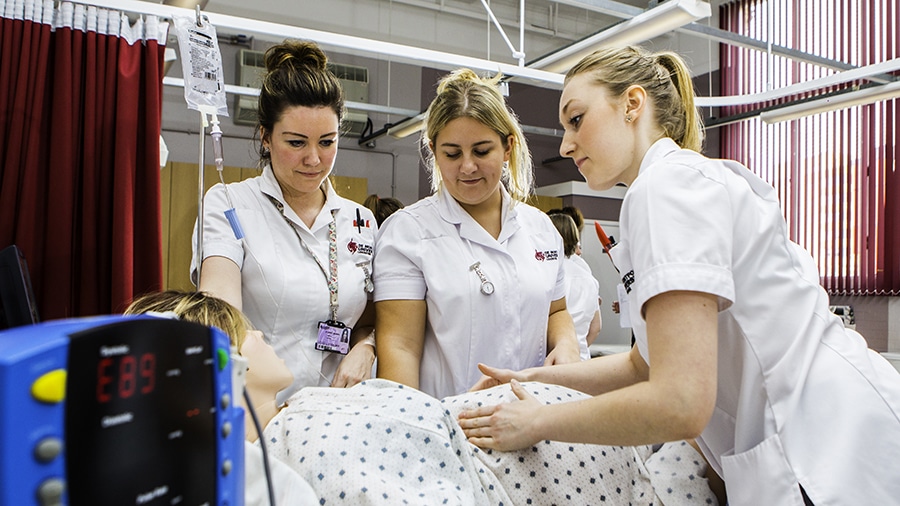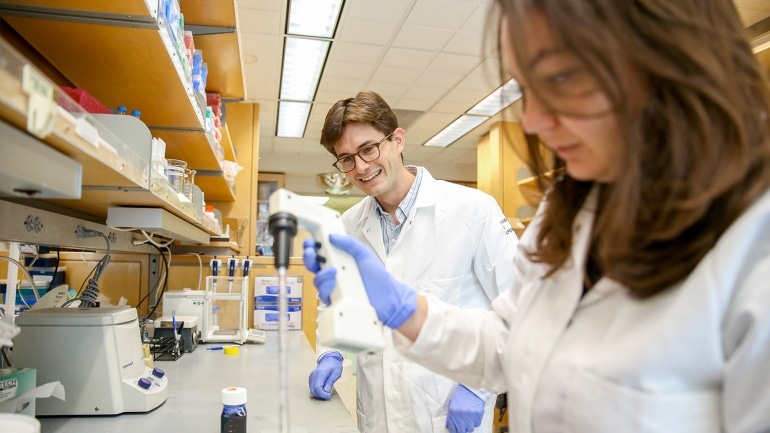A Dental hygienist is medical personnel that examines patients for signs of oral diseases, such as gingivitis, and provides preventive care, including oral hygiene.
To become a professional in this field, you must attend a good school. If you live in the Rochester area, you are at the right place. We’ve compiled a list of the best dental hygiene schools for you. You can choose the one that meets your career aspirations.
Table of Contents
- What is Dental Hygiene all about?
- What is a Dental hygienist school like?
- Why study Dental Hygiene in Rochester?
- How much does a Dental Hygienist earn in Rochester?
- How much does a Dental hygienist school in Rochester cost?
- How long does it take to complete a Dental hygienist program in Rochester?
- Which body accredits Dental hygienist schools in Rochester?
- Dental hygienist schools in Rochester in 2024?
- FAQs on dental hygienist schools in rochester
- Conclusion
- Reference:
- We Also Recommend
What is Dental Hygiene all about?
Dental hygiene is the process of keeping one’s mouth, teeth, and gums clean and healthy to avoid disease. Dental hygiene and dental health are sometimes taken for granted, although they are critical components of our daily life.
In reality, dental hygienists can be found in a variety of settings outside of the dentist’s office, including public and private schools, Head Start programs, mobile community clinics, hospitals, and event patient homes.
What is a Dental hygienist school like?
Academic programs at community colleges, technical colleges, dental schools, or universities prepare dental hygienists. The majority of community college programs last at least two years and award associate degrees to graduates. With this degree, a hygienist can take licensure exams (national, state, or regional), get licensed, and work in a dental office.
University-based dental hygiene programs may offer baccalaureate and master’s degrees, which typically necessitate at least two years of additional education. These extra degrees may be required for a career in education, research, or clinical practice in school or public health programs.
Admission requirements for dental hygiene programs vary based on the school. Health, biology, psychology, chemistry, mathematics, and speech classes in high school will be useful in a dental hygiene job. Most programs prefer applicants who have completed at least one year of college. Some baccalaureate degree programs require applicants to have two years of college experience before enrolling in a dental hygiene program. For detailed program prerequisites, contact the dental hygiene program of interest to you.
Clinical education in the form of supervised patient care encounters is provided by dental hygiene education programs. These programs also incorporate liberal arts courses basic sciences (e.g., anatomy, physiology, pharmacology, immunology, chemistry, microbiology, and pathology); and clinical sciences (e.g., English, speech, sociology, and psychology) (e.g., dental hygiene, radiology, and dental materials). Following the conclusion of a dental hygiene program, dental hygienists may opt to further their education in areas such as education, business administration, fundamental sciences, marketing, and public health.
Why study Dental Hygiene in Rochester?
There are numerous benefits of being a dental hygienist, some are;
Getting to enjoy a flexible work schedule
One of the most significant advantages of working as a dental hygienist is the ability to work around your schedule. Many various sorts of work patterns are popular in this sector, including full-time and Part-time or only on weekends. Many dental hygienists work in offices, working one or two days per week in each. While you may have to adjust your schedule from time to time to accommodate the demands of a busy dental practice, most dental hygienists can set their work hours to accommodate the demands of their hectic life.
Earning a good salary
Dental hygienists typically earn more than health technologists and technicians on average. In reality, the median dental hygienist wage in the United States is $74,820 per year or about $36 per hour5. Your actual income will be determined by factors such as where you reside and your level of experience, but the national median provides a decent indication of the competitive salary dental hygienists can earn.
Assist Others in Improving Their Health
The importance of dental hygiene extends far beyond a good smile. Poor dental health, according to the Mayo Clinic, can lead to major diseases and concerns with your overall health, such as cardiovascular disease, pregnancy complications, and more. Dental hygienists help patients not only feel better about their smiles and dental health but also live healthier lives.
Create a Lifetime Career as a Dental Hygienist
Entry-level dental hygienists can leave college and quickly advance into a fulfilling career. Best of all, it is a vocation in which your hours may be altered to meet your lifestyle and changing demands over time. Being a dental hygienist provides you with enormous flexibility and perks throughout your career, from parenthood to empty nests and even a soft retirement.
Discover Opportunities for Advancement in the Dental Field
Many people who want to be dentists start as dental hygienists. Earning your associate’s degree will prepare you for a career as a dental hygienist, where you will receive essential experience in the dental sector. You can then go on to earn your bachelor’s and master’s degrees in dentistry.
Alternatively, advanced degrees might be obtained to pursue research, teaching, or other specialized professions in dental hygiene. Some firms even provide tuition aid to employees who wish to further their education.
Stability of Employment
This job path is regarded as one of the fastest-rising occupations because of population growth and a greater emphasis on preventative care. What this means for you is that there will always be a strong demand for your services, whether you are just beginning a certification program or are far into your career as a dental hygienist.
Atmosphere That Values People
Most dental clinics prioritize making patients as comfortable as possible while educating them on how to properly care for their teeth and gums. As a dental hygienist, you can expect to work in a pleasant, welcoming workplace where you will interact with a wide range of people regularly. If you value oral health and enjoy assisting others, a career as a dental hygienist could be a good fit for you.
Possibilities for Advancement
To work as a dental hygienist in private practice, you’ll need at least a certificate or an associate’s degree. These training programs are well-organized so that students can finish them quickly and with a lot of hands-on experience. Even better, once you’ve started working as a dental hygienist, you can enroll in programs to earn a bachelor’s or master’s degree. With either of these, you will have numerous chances for growth, including positions in research or teaching the practice of dental hygiene.
How much does a Dental Hygienist earn in Rochester?
As of August 27, 2024, the average Dental Hygienist salary in Rochester, NY is $75,200, with a salary range of $65,311 to $85,505. Salary ranges can vary greatly depending on a variety of things, including schooling, certifications, supplementary talents, and the number of years you have worked in your field. Salary.com has more online, real-time compensation data than any other website, allowing you to pinpoint your specific wage target.
How much does a Dental hygienist school in Rochester cost?
The average tuition for a dental hygienist school in Rochester area is $12,000. Tuition might range from $4000 to $30,000 depending on the school you choose.
How long does it take to complete a Dental hygienist program in Rochester?
You’ll need between 20 and 30 months to complete an associate degree in dental hygiene at a community college or a technical health professions college. While there are numerous dental hygiene schools to choose from, you should select one that is accredited by the Commission on Dental Accreditation. Completing all school requirements in a dental hygienist program usually takes two to four years.
Which body accredits Dental hygienist schools in Rochester?
The USDE has only authorized the Commission on Dental Accreditation (CODA) to accredit dental hygiene education programs. In the United States, there are several hundred CODA-accredited dental hygiene programs. The Commission is a specialized accrediting agency that has been approved by the US Department of Education. Contact the Commission on Dental Accreditation at (312) 440-4653 or 211 East Chicago Avenue, Chicago, IL 60611. The Commission’s website can be found at http://www.ada.org/100.aspx.
Dental hygienist schools in Rochester in 2024?
Here are the best dental hygienist schools in rochester area.
- University of New York
- SUNY Farmingdale State College
- CUNY Hostos Community College
- SUNY Erie Community College
- SUNY Hudson Valley Community College
- SUNY Broome Community College
- Orange County Community College in New York
- SUNY Monroe Community College
- Canton, New York
- New York City College of Technology (CUNY)
#1. University of New York
Rated as the 6th best college in New York, University of New York is well-known as one of the best dental hygienist schools in Rochester.
The dental hygiene program at NYU’s College of Dentistry provides students an opportunity to learn by being part of an academic environment that includes acclaimed faculty from various specialty dentistry areas. In-depth classroom instruction is supported by extensive clinical rotations where students are exposed to specialty dental procedures.NYU offers 3 options for aspiring dental hygienists-
An associate degree with a fast track schedule that can be completed in as little as 17 months.
A traditional four-year bachelor’s.
A bachelor’s that is typically meant for students who have already completed their associate degree in dental hygiene. The tuition cost $37,739, and an SAT/ACT score range of 1350-1530 and a 30-34 is required to enter with a 16% acceptance rate, making admissions extremely competitive. The student-to-faculty ratio is 9:1. NYU College of Dentistry is fully accredited by the Commission on Accreditation of the American Dental Association.
#2. SUNY Farmingdale State College
Ranked as the 62nd Best College in New York, Farmingdale State Institution is an above-average public college located in Melville, situated 404 miles from Rochester.
It’s no surprise that it is one of the best dental hygienist schools. It is a medium-sized university with a total enrollment of 7,785 undergraduate students.
Entry to this school requires an SAT Range of 990-1150, and the acceptance rate is 55%, making admissions extremely competitive. You can enter the dental hygiene field by either completing an associate or bachelor’s degree, offered by the college.
While the former includes general education, biomedical and oral courses, the latter additionally includes courses that prepare you for a career in dental hygiene teaching and research. Both the programs prepare you to take the Dental Hygiene National examination as well as certification in the administration of local infiltration anesthesia and nitrous oxide.
To hone professional skills, you will go through a clinical practicum that is planned according to your individualized career goals in your specific topic of interest. Tuition costs $7,481. It is one of the best dental hygienist schools in Rochester. SUNY Farmingdale State College receives accreditation from the Commission on Dental Accreditation of the American Dental Association.
#3. CUNY Hostos Community College
Ranked fourth among New York’s best community colleges, CUNY Hostos is an above-average public college in The Bronx, New York, located 339.2 miles from Rochester.
It is a small college with a total enrollment of 3,758 undergraduate students a student-faculty ratio of 19:1. Students normally complete the Associate in Applied Sciences in Dental Hygiene degree in two years, including one summer session.
There is also a three-year option. Oral anatomy and physiology, dental radiology, nutrition, dental materials, and dental health education are all part of the curriculum. Students work with patients while being supervised by professional dentists and dental hygienists during the clinical component of the curriculum.
The tuition costs $5,628 a year and the application fee is $65. Hostos community college dental hygiene program is accredited by The Commission on Dental Accreditation of the American Dental Association.
#4. SUNY Erie Community College
Erie Community College is a public college in Buffalo and is located 65.5 miles from Rochester. It is a medium-sized university with a total enrollment of 6,252 undergraduate students with a student-to-faculty ratio of 17:1.
The acceptance rate for Erie Community College is 100 percent. Erie Community College offers intensive training in allied dental careers that prepare students to face the growing challenges of oral patient care. Armed with an experienced faculty, students are taught to be life-long learners by going through a learning process that is a fine blend of classwork, lab, and clinical experiences.
This associate degree takes two years to complete. The 69-credit coursework includes courses in oral health, anatomy, dental radiography, general psychology, periodontology, microbiology, dental materials, pharmacology, pathology, community dental health, and public speaking.
The well-rounded curriculum prepares you to take up positions as a dental hygienist in varied settings such as dental clinics, hospitals and perform functions that include patient assessment, removing plaque, and applying chemotherapeutic agents to treat dental diseases.
The college is highly selective in its admission process and before applying recommends students to complete courses in microbiology, oral communication, psychology, sociology with a minimum grade of “C.” Tuition costs $4,733 per year, also the application fee is $25. The Dental Hygiene Program is accredited by the Commission on Dental Accreditation of the American Dental Association.
#5. SUNY Hudson Valley Community College
Hudson Valley Community College is a public college in Troy, New York, located 228.0 miles from Rochester. It is a medium-sized university with a total enrollment of 5,401 undergraduate and 5,015 part-time undergraduates students with a student-teacher ratio of 19:1.
This college provides an Associate in Applied Science in Dental Hygiene program that requires 70 credit hours to complete. Anatomy and physiology, pathology, dental materials, dental imaging, and pharmacology are all covered in class.
Clinical experiences start in the second semester. Students who are members of the Student American Dental Hygienists’ Association will have the opportunity to assist the community in a range of events that take place throughout the year. Tuition costs $8,340 per year. The program is accredited by the Commission on Dental Accreditation of the American Dental Association,
#6. SUNY Broome Community College
Broome Community College is a public college in Dickinson, New York, 158.1 miles from Rochester. It is a tiny college with a total enrollment of 3,448 undergraduate students and a student-faculty ratio of 16:1.
Broome Community College has a 100% acceptance rate. The Health Sciences Division provides a curriculum leading to an Associate in Applied Science in Dental Hygiene. The two-year program covers classes in pathogenic biology, dental materials, pain management, periodontology, and dental radiography.
Students also gain clinical experience by providing care to patients and learning about treatment planning, assessment, evaluating patient care, and instrumentation.
The institution features a dental hygiene clinic on campus that includes two laboratories, classrooms, seven x-ray units, and 26 dental units. This program is accredited by Commission on Dental Accreditation of the American Dental Association.
#7. Orange County Community College in New York
SUNY Orange is a public university in Middletown, New York, 276.9 miles from Rochester. It is a small college with a total enrollment of 2,680 fill-time undergraduate students and 3,692 3,692 part-time undergraduates with a student-teacher ratio of 18:1.
The Associate in Applied Science in Dental Hygiene program has a credit requirement of 70. Preventive oral health care, dental biomaterials, oral health education, pain management, nutrition, and oral pathology are all covered in the curriculum.
In addition to clinical experiences in the on-campus dental hygiene clinic, students often participate in clinical experiences at off-campus locations. Students in the program must join the Student American Dental Hygienists’ Association and present clinical cases. Tuition is $4,325 per year and the application fee is $30. This program is accredited by the Commission on Dental Accreditation of the American Dental Association.
#8. SUNY Monroe Community College
Monroe Community College is one of the best dental hygienist schools in rochestera area. It is a medium-sized university with a total enrollment of 6,927 undergraduates and has a student-to-faculty ratio of 20:1.
This two-year associate of applied science program in dental hygiene is a fine blend of liberal arts, dental science, and clinical experience that will train you to take up entry-level positions. The clinical training part of your curriculum will be in a proper dental setting, where you will gain hands-on learning experience. Upon completion of the coursework, you will be qualified to take the national board examination.
To be eligible for this program the college requires you to complete courses in Math, biology, and chemistry. Tuition costs $6,968 per year. This program is accredited by the Commission on Dental Accreditation of the American Dental Association.
#9. Canton, New York
SUNY Canton is a public university in Canton, New York, 210.7 miles from Rochester. It is a tiny college with a total enrollment of 2,784 undergraduate students and a student-teacher ratio of 18:1. The admittance rate at SUNY Canton is 85%. Entry requires an SAT score of 920-1110 and an ACT score of 18-23.
This university offers an associate’s degree and a bachelor’s degree in dental hygiene. The dental hygiene theory courses will be offered in a hybrid delivery. SUNY Canton’s highly qualified classroom combines traditional classroom instructions with online instruction, which means that students have unlimited access to course lectures and interactive learning activities.
The annual tuition is $13,285 and the application fee is $50. This program is accredited by Commission on Dental Accreditation of the American Dental Association.
New York City College of Technology (CUNY)
CUNY New York City Tech is a public college in Brooklyn, New York, located 349.5 miles from Rochester. It is a large university with a total enrollment of 10,572 undergraduate students with a student-to-faculty ratio of 18:1.
A SAT score in the range of 843-1030 is required for admission, the admittance rate at CUNY New York City Tech is 88 %. The college offers an associate with a major in Dental Hygiene that combines theory, laboratory, and clinical experiences to prepare students to work in private dental practices, public and private health agencies, hospitals, and industrial clinics.
The courses you will complete include human anatomy and physiology, mathematical and quantitative reasoning, principles of dental hygiene, oral anatomy, psychology, public speaking, periodontics, dental radiology, microbiology, pathology, pharmacology, dental materials, nutrition, and public health. The annual tuition is $4,652 and the application fee is $65. This program is accredited by Commission on Dental Accreditation of the American Dental Association.
FAQs on dental hygienist schools in rochester
- Bachelor’s Degree
- Health management
- Allied health education
- Cleaning techniques
- History of dental medicine
- Oral anatomy.
According to the U.S. Bureau of Labor Statistics, registered nurses earn an average salary of $75,330 per year. Meanwhile, dental hygienists earn a median annual salary of $77,090 in the United States.
You’ll likely need to meet prerequisites and have a GPA of 2.5 or higher.
The completion of all educational requirements in a dental hygienist program will typically take between two and four years.
The states and districts that pay Dental Hygienists the highest mean salary are Alaska ($114,790).
Cardiovascular Technologists and Technicians.
Dental Assistants.
Medical Assistants.
Radiologic Technologists.
Pharmacy Technicians.
Surgical Technologists.
Dentists.
Conclusion
According to the BLS, demand for dental hygienists will be particularly strong in rural areas with limited access to dental care.
Demand for dental treatments is also being driven by a greater understanding of the benefits of preventative dental care. Therefore, pursuing a career in dental hygiene will certainly not be a bad idea.
Hopefully, this article guides you as you make your choice.
Reference:
- https://www.niche.com/colleges/search/best-colleges-with-dental-hygiene/s/new-york/
- https://www.nursingprocess.org/dental-hygiene-programs/new-york/





